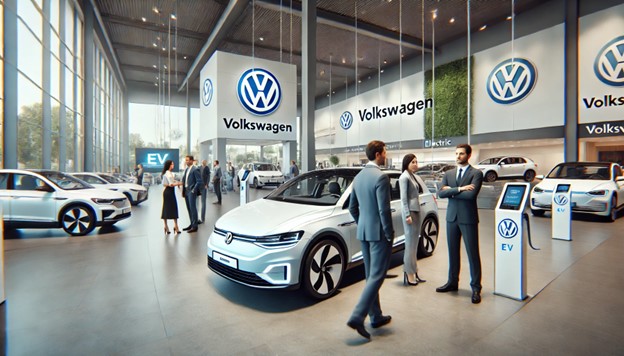Volkswagen, one of the world’s largest car manufacturers, has revised its sales and profitability outlook for 2024, joining other European automakers in adjusting expectations as the global automotive industry grapples with numerous challenges. These include rising competition, especially from Chinese automakers, and the ongoing transition to electric vehicles (EVs), which has proven more turbulent than anticipated.
Lower Sales and Delivery Forecasts
Volkswagen announced a reduction in its sales forecast for 2024, now expecting revenue of approximately €320 billion ($357.68 billion), down from the €322.3 billion reported in 2023. This revised figure reflects the company’s anticipation of delivering around 9 million vehicles, a significant drop from the 9.24 million units delivered in the previous year. Initially, Volkswagen had forecasted a sales increase of up to 5%, but this optimism has been dampened by current market realities.
The reduction in forecasted deliveries marks a critical moment for Volkswagen, as it signifies the company’s struggle to meet previous growth targets amid intensifying competition. The company had projected up to a 3% increase in vehicle deliveries, but challenges, particularly in the electric vehicle market, have forced a reconsideration of these goals.

Industry-Wide Struggles
Volkswagen is not alone in facing headwinds. Many European automakers are experiencing similar difficulties, driven largely by the rapid transition to electric vehicles and the rising costs of production. As the automotive landscape changes, traditional car manufacturers are under immense pressure to modernize their fleets and develop more sustainable technologies. However, this transition comes with significant costs, both in terms of research and development and production.
Earlier in September, Volkswagen indicated that it was considering the closure of certain factories in Germany as part of a larger cost-cutting and restructuring strategy. This plan aims to safeguard the company’s competitiveness in an increasingly difficult market, particularly as labor and production costs rise. The potential factory closures underscore the urgency with which Volkswagen must act to remain competitive amid mounting pressures.
Fierce Competition from China
One of Volkswagen’s most significant challenges is the fierce competition from Chinese car manufacturers. In recent years, Chinese automakers have gained considerable market share, particularly in the electric vehicle sector, thanks to aggressive pricing strategies and a faster transition to EV production. This has left Volkswagen, along with other European automakers, struggling to keep pace.
China’s domestic carmakers have leveraged their home market advantage, offering electric vehicles at lower prices and quickly adapting to market demands. As a result, Volkswagen has found itself losing ground in a region that had previously been one of its most important markets. The aggressive push by Chinese companies to dominate the EV market further complicates Volkswagen’s efforts to secure its place as a leader in the global automotive industry.
Lower Profitability and Cash Flow Projections
In addition to cutting sales and delivery forecasts, Volkswagen also slashed its profitability expectations. The company now projects an operating return on sales of around 5.6%, a sharp decline from the previously estimated range of 6.5% to 7%. This reduction in profitability highlights the financial strain the company is experiencing as it navigates the complexities of the evolving automotive market.
Volkswagen’s automotive division, a key focus for analysts and investors, is also facing challenges in terms of cash flow. The company expects net cash flow to be around €2 billion, down from an earlier projection of €2.5 billion to €4.5 billion. This drop further emphasizes the impact of rising costs and increased competition on Volkswagen’s overall financial performance.
The Road Ahead for Volkswagen
As Volkswagen continues to face these significant industry challenges, its path forward will likely involve difficult decisions, including potential factory closures and a focus on cost reduction. The company’s restructuring efforts will be crucial in maintaining its position in the global market, particularly as it continues to compete with both traditional automakers and new players in the electric vehicle space.
Additionally, Volkswagen’s success will depend on its ability to innovate and accelerate its transition to electric vehicles while managing rising production costs and maintaining profitability. With Chinese competitors rapidly advancing in the EV sector, Volkswagen must adapt quickly to avoid further erosion of its market share.
Despite the challenges, Volkswagen remains one of the largest and most influential car manufacturers in the world. Its ability to navigate this turbulent period will be a key indicator of the broader automotive industry’s success in transitioning to a more sustainable, electric future. However, as recent forecasts show, the road ahead will not be without its obstacles.












